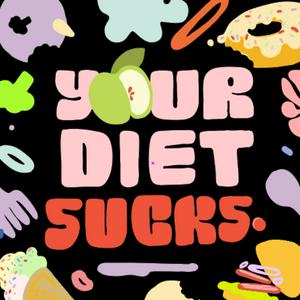Intermittent fasting is the most Googled diet-related term on the planet, except everyone who does it will tell you it's not a diet. It's a protocol. An eating window. A lifestyle. An optimization hack. Definitely, absolutely, under no circumstances a diet. You just don't eat for sixteen hours. Totally different.
In this episode, we trace IF from ancient religious fasting traditions through its secularization and commodification, afrom Martin Berkhan's Leangains forum and its tagline ("fuck breakfast") to Michael Mosley's BBC documentary, Hugh Jackman's Wolverine physique, and Jack Dorsey describing his weekend-long fasts as "hallucinating" like that's a selling point. We walk through how a Nobel Prize in yeast biology became a justification for skipping breakfast, why Jason Fung's The Obesity Code scored 31% on scientific accuracy and still became the IF bible, and how the fasting app market turned one simple rule into a multimillion-dollar industry.
Then we get into what the science actually says. We break down the claimed mechanisms — metabolic switching, autophagy, insulin sensitivity — and look honestly at where the evidence lands. Spoiler: the mechanisms are real, but the confidence far outpaces the human data. The first direct measurement of autophagy in humans was published in 2025. Mouse metabolism runs seven times faster than ours. And the landmark Liu et al. trial in the New England Journal of Medicine found that time-restricted eating is no better than regular caloric restriction for weight loss. You're not metabolic switching. You're just eating less.
We also dig into what IF means for active people (no performance benefit across any exercise type, real risk of under-fueling and RED-S, and a protein distribution problem that no eight-hour window can solve), what the AHA, ADA, NIA, and ISSN actually say about it, and the robust research linking IF to eating disorder behaviors across all genders — including a landmark study showing that fasting was a stronger predictor of binge eating disorder than any other form of dietary restraint. Fasting is listed in the DSM-5 as a compensatory behavior. Just because you give it a different vocabulary doesn't mean your body experiences it differently.
Your body is smarter than any fasting app. Also, breakfast slaps..
This Episode's Sponsors:
rabbit — Code YDSFEB for 10% off
Osmia — Code YDS20 for 20% off
Tailwind — Code YOURDIET20 for 20% off
Microcosm Coaching — Book a free consultation
Full references, episode archive, and our advertising ethics policy at yourdietsuckspodcast.com
Hosted by: Zoë Rom & Kylee Van Horn, RDN


